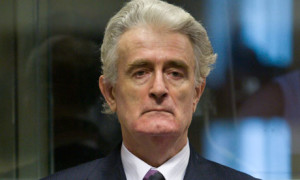 Today, Radovan Karadzic has filed an appeal to the UN’s Mechanism for International Criminal Tribunals against his conviction by the International Criminal Tribunal for the former Yugoslavia (ICTY) in March this year.
Today, Radovan Karadzic has filed an appeal to the UN’s Mechanism for International Criminal Tribunals against his conviction by the International Criminal Tribunal for the former Yugoslavia (ICTY) in March this year.
The 238-page appeal “details 48 substantive and procedural errors” that led to an incorrect verdict, according to a statement issued by Karadzic’s lawyer Peter Robinson.
“Unless corrected, flawed trials and unjust judgments like mine will only accelerate the flight of countries such as South Africa and Russia from an international legal system that is politicised and based on double standards,” Karadzic said in the statement.
“It will also ruin the chance for international justice to succeed in the long term by establishing legal precedents based on short-term political expediencies,” the former Bosnian Serb political leader added.
Karadžić was charged with responsibility for atrocities including the siege of Sarajevo and the 1995 massacre of 8,000 Muslim men in the Srebrenica enclave.
The ICTY found Karadžić guilty in 10 of 11 counts, including genocide, crimes against humanity (in the form of persecution, extermination, murder, deportation, and inhumane acts) and violations of the laws and customs of war (including murder, terror, unlawful attacks on civilians and taking of hostages).
The Trial Chamber found that Karadžić had been responsible for genocide in Srebrenica, where close to 8,000 Bosnian Muslim men and boys were murdered in 1995, on the basis of his membership in a Joint Criminal Enterprise (JCE), but not in other Bosnian municipalities. He was further convicted of persecution, extermination, deportation, forcible transfer and murder in connection with a campaign to drive Bosnian Muslims and Croats out of villages claimed by Serb forces during the country’s 1992-1995 civil war.
Karadžić, currently 70 years, was sentenced to 40 years’ imprisonment, while receiving credit for the time already spent in detention (8 years).
Karadzic rejected the basis of the genocide judgment, saying that “never has a conviction for such a serious crime rested on such a shaky foundation”.
He also said that his conviction for terrorising the population of Sarajevo during the Bosnian Serb siege of the city from 1992-95 “disregarded his many orders aimed at preventing fire against civilians and misapplied principles of ‘distinction’ and ‘proportionality’ by failing to assess the shelling from the perspective of a military commander”.
He accused the tribunal of “shifting the burden of proof to him to prove his innocence by taking of judicial notice of 2,379 adjudicated facts from other trials and admitting written testimony of 148 prosecution witnesses”.
The appeals chamber of the Mechanism for International Tribunals, which is taking over the remaining work of the ICTY as it shuts down, will rule on the appeals.
